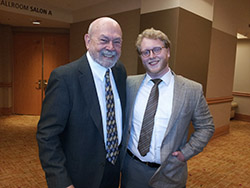
As buddies in the Cognitive Neurology and Alzheimer’s Disease Center’s Buddy Program, Jared Worthington, a second-year medical student, and Dan Winship, a person with Alzheimer’s disease and retired physician and dean, built a relationship over the past year going on trips to the zoo, sporting events and dinners.
“Through this experience I saw how being diagnosed with dementia and Alzheimer’s disease doesn’t mean that this is it, they still have many years left of life. I don’t think many people realize that persons with Alzheimer’s can engage and participate and give back and have fun and build relationships,” Worthington said.
Dan’s wife Jean Schmidt Winship, program manager in the Physician Assistant Program, said that being in a mentorship role provided Dan with purpose.
“I think an important aspect of the program is students learning to approach their patients holistically, and I know for Dan, he wants to be approached with empathy and respect. He wants medical students to embrace that in their future practice,” Winship said. “The experience makes Dan feel productive and valued, and it’s important to make sure that future physicians know that there is so much more to an Alzheimer’s diagnosis than the end stage.”
Started in 1998, the buddy program matches first year medical students with patients diagnosed with early Alzheimer’s disease or a related illness. Each year 10 to 15 medical students volunteer in the program and commit to spending at least four hours a month with their buddy, or mentor. Funded by The Glen and Wendy Miller Family Foundation, the goal of the program is to educate students about the disease outside of the clinic and to give patients the ability to mentor students about daily issues they face and how to communicate with persons with dementia.
This fall, Worthington and the Winships travelled to Toronto to give a presentation about their experiences in the program at the Canadian Health Summit.
“People were very receptive and interested in replicating the program,” Winship said. “The presentation sparked people to think about what is in their own backyard, that they can work with other institutions in their neighborhoods and provide resources for social engagement.”
The group presented the benefits of the program between the buddies, and the effect it has had on Jean and Dan’s relationship.
“Nothing makes me happier than seeing Dan light up when he is going out with his buddy. And it’s been wonderful to learn what the CNADC offers and meet other mentors and their families,” Winship said.
Worthington became involved in the program because his grandmother was also diagnosed with Alzheimer’s disease.
“The first time I heard their story, it really hit home with what my family was going through,” he said. “I’ve always had an interest in psychiatry and neurology but I think this experience has really pushed me in that direction even more.”
Now in his second year, Worthington plans to keep in touch with Dan to continue to build their relationship, even though he knows he will witness the progression of the disease.
“It’s a tough perspective but an important one, it’s something you don’t get in your typical medical school education to see the progression of the disease and see how those changes occur and how people deal with them,” he said.





